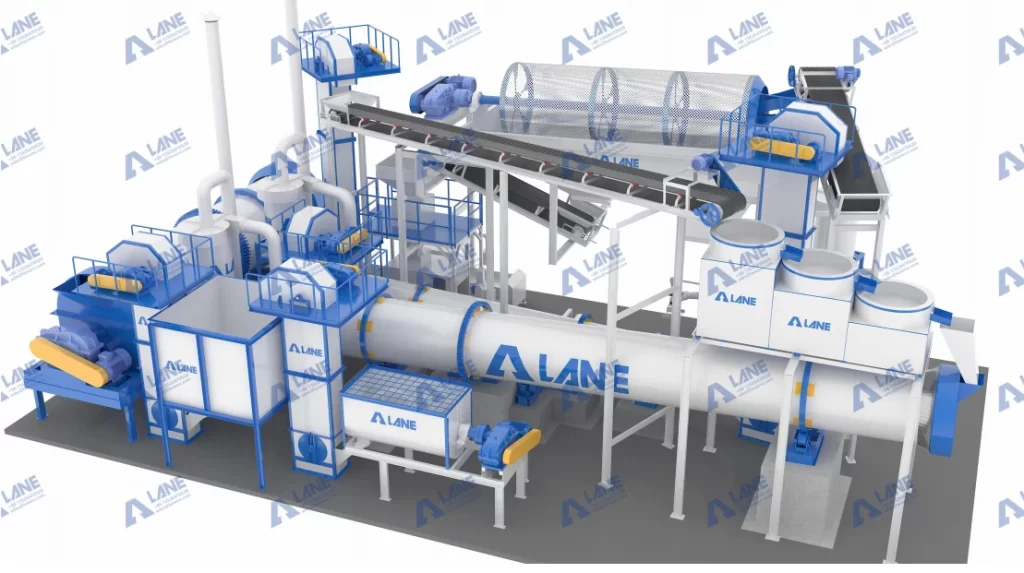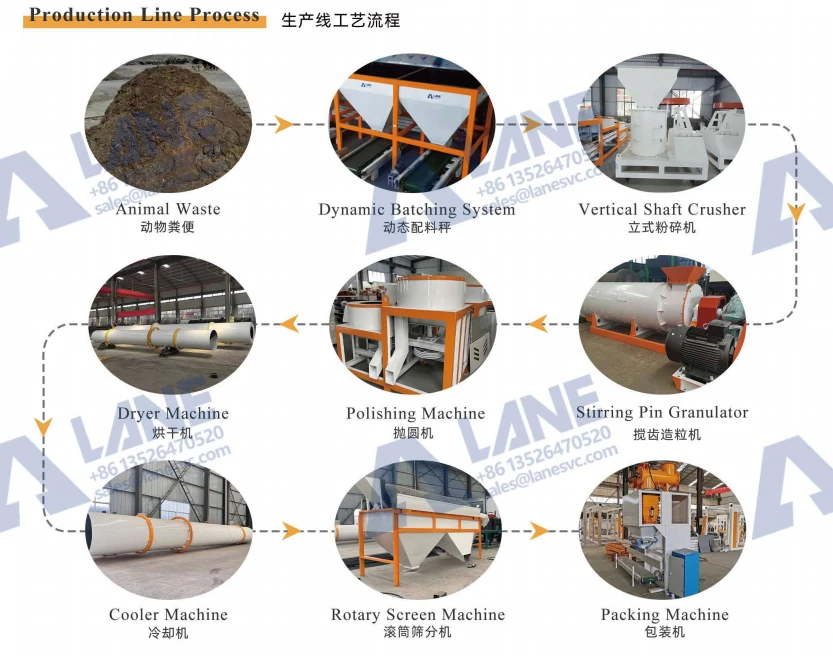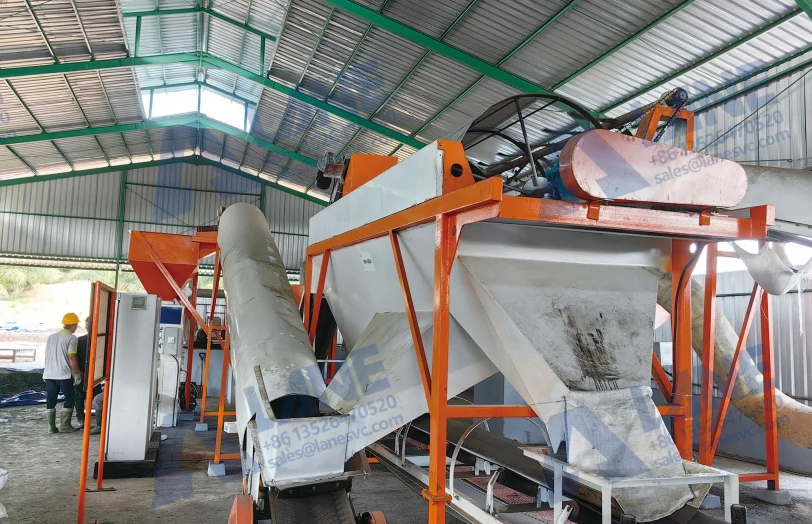Organic fertilizer for organic farming is the backbone of sustainable agriculture. Unlike chemical fertilizers that often degrade soil quality over time, organic fertilizer enriches the soil with natural nutrients and beneficial microorganisms. Farmers worldwide are turning to organic solutions not only to meet regulatory standards but also to improve crop quality, enhance soil fertility, and reduce environmental impact.
Producing high-quality organic fertilizer requires modern equipment and standardized processes. At LANE Heavy Industry, we provide complete organic fertilizer production lines that transform raw animal waste and agricultural residues into nutrient-rich organic fertilizer for organic farming. Our machinery is widely used in Asia, Africa, and Europe, helping farmers achieve efficiency and profitability.

Why Organic Fertilizer for Organic Farming Matters
Organic farming emphasizes soil health, biodiversity, and sustainable yield. Fertilizer is a critical part of this system. By using organic fertilizer for organic farming, farmers achieve:
Improved Soil Structure: Organic matter enhances aeration and water retention.
Balanced Nutrient Supply: Provides nitrogen, phosphorus, potassium, calcium, and micronutrients naturally.
Environmental Protection: Reduces water contamination and greenhouse gas emissions compared to synthetic fertilizers.
Better Crop Quality: Organic crops are healthier, chemical-free, and often fetch higher market prices.
| Comparison | Chemical Fertilizer | Organic Fertilizer for Organic Farming |
| Soil Impact | Depletes long-term fertility | Improves structure & fertility |
| Nutrient Release | Fast but unbalanced | Slow, steady, and balanced |
| Environmental Effect | Pollution risk | Eco-friendly |
| Crop Health | May cause chemical residues | Healthier, chemical-free |
Production Process of Organic Fertilizer for Organic Farming Step by Step
A modern organic fertilizer production line ensures efficient and standardized processing. Below are the detailed steps, each supported by LANE’s advanced machinery:
1. Raw Material Collection: Animal Waste
The foundation of organic fertilizer for organic farming is animal manure, such as cow dung, chicken manure, and pig waste. Crop residues, food waste, and green manure can also be included. Proper selection of raw materials ensures nutrient diversity.
The dynamic batching system is essential for maintaining the correct proportion of raw materials. With precise electronic weighing, LANE’s batching machines guarantee consistency in every batch, ensuring that the final organic fertilizer meets nutrient requirements for organic farming.
Large clumps of manure or crop residues are broken down by the vertical shaft crusher, producing uniform particle size. This step improves fermentation efficiency and granulation quality.
Granulation is a critical step in producing high-quality organic fertilizer for organic farming. The stirring pin granulator mixes and shapes the material into uniform granules, ensuring easy handling and better application in the field.
5. Dryer Machine
Moisture control is key for fertilizer stability. The dryer machine removes excess water, reducing moisture content to less than 15%. This ensures longer shelf life and prevents caking.
6. Cooler Machine
After drying, the fertilizer granules are cooled using the cooler machine, maintaining granule strength and preventing nutrient loss.
The rotary screen machine separates qualified granules from fine powder or oversized particles. Oversized material is returned to the crusher, while fines are sent back to the granulator, ensuring minimal waste.
8. Polishing Machine
To improve appearance and market value, the polishing machine rounds the granules, creating smooth, uniform shapes. This makes organic fertilizer for organic farming more appealing for commercial sale.
9. Packing Machine
Finally, the packing machine measures and packs the fertilizer into bags of different sizes. LANE’s packing systems support automatic weighing, sealing, and stitching, ensuring efficiency and accuracy.

Case Study: Organic Fertilizer for Organic Farming in Africa
Example 1: Poultry Farm in Kenya
In Kenya, a medium-scale poultry farm partnered with LANE Heavy Industry to establish a complete organic fertilizer production line. Before this project, the farm faced several problems: odor complaints from nearby communities, excessive manure accumulation, and inconsistent soil fertility on its crop fields.
After installing LANE’s crawler type compost turner, granulation system, and automatic packing line, the farm achieved significant results:
Daily Capacity: 20 tons of organic fertilizer produced from poultry manure.
Fermentation Efficiency: Reduced composting time from 40 days to just 18 days.
Soil Improvement: Farmers applying the fertilizer to maize and vegetable crops observed improved yields and healthier soil texture.
Economic Return: The farm not only solved waste disposal problems but also generated additional annual revenue of over $200,000 by selling organic fertilizer to neighboring cooperatives.
This example illustrates how organic fertilizer for organic farming can transform waste management into a profitable agribusiness in East Africa.
Example 2: Pig Farm in Nigeria
In Nigeria, pig farming is rapidly expanding, but manure management has become a pressing challenge. One large pig farm located near Lagos adopted LANE’s organic fertilizer production line to convert pig waste into value-added fertilizer.
Key outcomes included:
Production Scale: 30 tons of pig manure processed per day, yielding around 15 tons of finished fertilizer.
Odor & Pollution Control: The composting process reduced harmful gas emissions, improving air quality around the farm.
Market Demand: Organic fertilizer was in high demand among cassava and rice farmers, leading to strong local sales.
ROI: Within 14 months, the farm recovered its investment costs due to high fertilizer sales and reduced waste management expenses.
Sustainability Impact: The project received recognition from local agricultural authorities as a model of eco-friendly farming.
This Nigerian case highlights the versatility of organic fertilizer for organic farming, showing that modern production lines can be successfully implemented even in regions with infrastructural challenges.

Global Market Trends of Organic Fertilizer for Organic Farming
The demand for organic fertilizer for organic farming has been growing rapidly worldwide. According to recent agricultural market reports:
The global organic fertilizer market is expected to reach USD 15 billion by 2030.
Asia-Pacific dominates the market, with China and India investing heavily in organic farming.
Africa and Latin America are emerging as fast-growing regions due to government support and rising demand for sustainable food.
Europe is focusing on stricter environmental regulations, pushing conventional farms to transition toward organic fertilizer.
LANE is actively involved in these markets by supplying organic fertilizer production lines that meet international quality standards. With strong R&D capacity and customization, LANE helps clients adapt to local regulations and consumer preferences.
Investment Return Analysis of Organic Fertilizer Production Line
Investing in an organic fertilizer production line is not only eco-friendly but also highly profitable.
Cost Structure:
Initial investment: Machinery and installation.
Operating cost: Labor, electricity, and raw materials.
Maintenance: Spare parts and service (minimized by LANE’s durable design).
Profit Drivers:
Sale of organic fertilizer for organic farming (higher price compared to chemical fertilizer).
Reduced manure disposal costs.
Improved crop yields on the farm itself.
Government subsidies in many regions for organic farming projects.
ROI Example:
A medium farm processing 30 tons of manure per day can produce about 15 tons of finished organic fertilizer. With an average market price of $200/ton, daily sales revenue can reach $3,000. Even after deducting operating costs, payback time is often less than 18 months.
Advantages of Choosing LANE for Organic Fertilizer Production
LANE Heavy Industry is a trusted manufacturer of fertilizer equipment with years of global experience. Our key advantages include:
Customized Design: Production lines tailored to farm size and raw material types.
Durable Equipment: Strong frames, anti-corrosion materials, and long service life.
Advanced Technology: Efficient aeration systems, automated batching, and energy-saving designs.
After-Sales Service: On-site installation, operator training, and lifetime support.
Global Reach: Projects successfully implemented in Pakistan, Indonesia, Kenya, and Europe.
Frequently Asked Questions (FAQ)
Q1: What raw materials can be used to make organic fertilizer for organic farming?
A: Common materials include animal manure, crop residues, food waste, and green manure.
Q2: How long does the production process take?
A: Depending on the composting method and equipment, fermentation usually takes 15–20 days.
Q3: Can small farms also invest in organic fertilizer production lines?
A: Yes, LANE offers small-scale models for family farms and large-scale lines for industrial use.
Q4: What is the shelf life of organic fertilizer for organic farming?
A: Properly dried and packed fertilizer can last over 12 months without losing quality.
Q5: How does LANE support clients after installation?
A: We provide technical training, spare parts supply, and long-term maintenance services.
The future of agriculture lies in sustainability, and organic fertilizer for organic farming plays a central role in this transformation. With modern production lines, waste can be converted into valuable resources, supporting food security, environmental protection, and farmer profitability.
By partnering with LANE Heavy Industry, farmers and agribusinesses gain access to high-performance machinery, reliable service, and global expertise. Whether you operate a small farm or a large fertilizer plant, our solutions empower you to produce consistent, high-quality organic fertilizer for organic farming.
Looking ahead, the demand for organic fertilizer production line will only continue to rise as consumers prefer healthier food and governments tighten environmental policies. Choosing advanced equipment today means building a greener, more profitable future for tomorrow.
For more details, please feel free to contact us.
Henan Lane Heavy Industry Machinery Technology Co., Ltd.
Email: sales@lanesvc.com
Contact number: +86 13526470520
Whatsapp: +86 13526470520